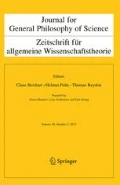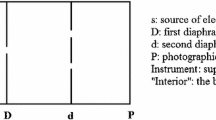Summary
The question underlying this article is whether the Kantian transcendental philosophy is wide enough to constitute the objects of quantum physics as objects of possible experience and consequently to found the objectivity of quantum physical knowledge. It is shown that the Kantian determinations of the categories (quality, substance, causality) can be interpreted and elaborated in such a way that the quantum physical concept of an object characterized by nonobjectivity of properties is conceived. Therefore the categories are valid in quantum mechanics and warrant the objectivity of quantum physical experience. By the interpretation of the Kantian infinite judgement as an indefinite proposition it is possible to define the non-objectivity of properties categorially as indefiniteness of qualities. In particular by the indefiniteness of the position-quality the non-permanent localizability of quantum mechanical objects can be understood a priori. However the object of possible experience, especially the quantum mechanical object is underdetermined by the categories of substance and causality: If the object is determined to be a substance it is not yet conceived to be an individual; its characterization by means of probability laws is categorially indeterminate. In so far the significance of transcendental philosophy for the foundation of quantum physics is limited.
Similar content being viewed by others
Literatur
Black, M., The Identity of Indiscernibles, in: Mind, Vol. LXI, No. 242, April 1952, S. 153–164
Bohr, N., Das Quantenpostulat und die neuere Entwicklung der Atomistik in: Die Naturwissenschaften, 16. Jahrgang, Heft 15, April 1928 S 245–257
Bohr, N., Über Erkenntnisfragen der Quantenphysik, in: Max-Planck-Festschrift 1958, S. 169–175
Busch, P., Unbestimmtheitsrelation und simultane Messungen in der Quantentheorie, Diss., Köln 1982
Busch, P., u. P.J. Lahti, A Note on Quantum Theory, Complementarity, and Uncertainty, in: Philosophy of Science, Bd. 52, 1985, S. 64–77
Cassirer, E., Determinismus und Indeterminismus in der modernen Physik, Göteborgs Högskolas Arsskrift. Bd. 42. 1936, Göteborg 1937, neu erschienen in: ders., Zur modernen Physik, Wiss. Buchgesellschaft, Darmstadt 1972, S. 129ff.
Heisenberg, W., Physikalische Prinzipien der Quantentheorie (1930), Bibliograph. Institut, Mannheim 1958
Heisenberg, W., Physik und Philosophie, Hirzel, Stuttgart 1972
Kant, I., Kritik der reinen Vernunft, zit. als KrV, 1. Aufl. A (1781), 2. Aufl. B (1787)
Leibniz, G.W., Neue Abhandlungen über den menschlichen Verstand (1765), Felix Meiner, Hamburg 1971
Lorenz, K., Die Begründung des principium identitatis indiscernibilium, in: Studia Leibnitiana, Supplementa Vol. III, Akten d. intern. Leibniz-Kongresses Hannover Nov. 1966, F. Steiner Verlag, Wiesbaden 1969, S. 149–159
Ludwig, G., Foundations of Quantum Mechanics I, Springer, New York 1983
Mittelstaedt, P., Philosophische Probleme der modernen Physik, Bibliograph. Institut, Mannheim, 6. Aufl., 1981
Mittelstaedt, P., Quantum Logic, D. Reidel Publ. Co., Dordrecht, Holland 1978
Mittelstaedt, P., Wahrheit, Wirklichkeit und Logik in der Sprache der Physik, in: Zeitschr. f. allg. Wissenschaftstheorie, XIV/1 (1983), S. 24–45
Mittelstaedt, P., Über die Bedeutung und Rechtfertigung der Quantenlogik, in: Moderne Naturphilosophie, hrsg. v. B. Kanitscheider, Verlag Königshausen + Neumann, Würzburg 1984
Mittelstaedt, P., Benennung und Identität in der Sprache der Physik, in: Zeitschr. f. allg. Wissenschaftstheorie, im Erscheinen
Stachow, E.-W. Logical Foundation of Quantum Mechanics, in: Intern. Journ. of Theor. Physics, Vol. 19, No. 4, 1980, S. 251–304
Stachow, E.-W., Classical and non classical limiting cases of quantum logic, in: Reduction in Science, W. Balzer, D. A. Pearce and H.-J. Schmidt (eds.), D. Reidel Publ. Co. Dordrecht, Holland, S. 397–418
Strohmeyer, I., Transzendentalphilosophische und physikalische Raum-Zeit-Lehre, Bibliograph. Institut, Mannheim 1980
v. Weizsäcker, C.F., Zum Weltbild der Physik, Hirzel, Stuttgart, 12. Aufl., 1976
v. Weizsäcker, C.F., Kants erste Analogie der Erfahrung und die Erhaltungssätze der Physik, in: Argumentationen, Festschr. f. Josef König, Göttingen 1965
Author information
Authors and Affiliations
Rights and permissions
About this article
Cite this article
Strohmeyer, I. Tragweite und Grenze der Transzendentalphilosophie zur Grundlegung der Quantenphysik. Zeitschrift für Allgemeine Wissenschaftstheorie 18, 239–275 (1987). https://doi.org/10.1007/BF01801088
Issue Date:
DOI: https://doi.org/10.1007/BF01801088



